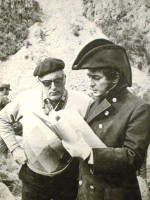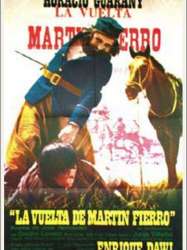Hugo Arana is a Actor Argentin born on 23 july 1943

Hugo Arana (born July 23, 1943) is an Argentinian film, television and theatre actor.
Arana was born in Buenos Aires, grew up in Monte Grande and moved with his family to Lomas de Zamora and then Lanús. He studied acting with Marcello Lavalle and Augusto Fernandez.
In his first years as an actor, he was part of a theatre group called "Errare Humanum Est" and he acted in films such as El Santo de la Espada (1970) and La tregua (1974).
In the 1980s, he became popular for his part in an advertisement for Crespi wine, and then for his part in the TV Sitcom Matrimonios y algo más (directed by Hugo Moser), in which he played two characters who were highly acclaimed by the public: the "Groncho" (in the comedy sketch "El Groncho y La Dama" (The Shabby Man and the Lady)) and Huguito Araña (a stereotypically femenine gay man).
He has worked on the Telefé TV series Los exitosos Pells, where he played the director of the fictitious channel "Mega News", Franco Andrada.
Source : Wikidata
Hugo Arana

- Infos
- Photos
- Best films
- Family
- Characters
- Awards
Birth name Ricardo Hugo Arana
Nationality Argentine
Birth 23 july 1943
Death 11 october 2020 (at 77 years)
Nationality Argentine
Birth 23 july 1943
Death 11 october 2020 (at 77 years)
Arana was born in Buenos Aires, grew up in Monte Grande and moved with his family to Lomas de Zamora and then Lanús. He studied acting with Marcello Lavalle and Augusto Fernandez.
In his first years as an actor, he was part of a theatre group called "Errare Humanum Est" and he acted in films such as El Santo de la Espada (1970) and La tregua (1974).
In the 1980s, he became popular for his part in an advertisement for Crespi wine, and then for his part in the TV Sitcom Matrimonios y algo más (directed by Hugo Moser), in which he played two characters who were highly acclaimed by the public: the "Groncho" (in the comedy sketch "El Groncho y La Dama" (The Shabby Man and the Lady)) and Huguito Araña (a stereotypically femenine gay man).
He has worked on the Telefé TV series Los exitosos Pells, where he played the director of the fictitious channel "Mega News", Franco Andrada.
Usually with
Filmography of Hugo Arana (15 films)
Actor
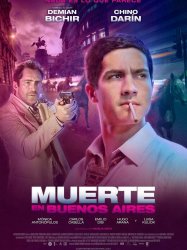
Death in Buenos Aires (2014)
, 1h31Genres Drama, Thriller, Crime, Romance
Themes Films about sexuality, LGBT-related films, LGBT-related films, LGBT-related film
Actors Demián Bichir, Hugo Arana, Carlos Casella, Jorgelina Aruzzi, Luisa Kuliok
Roles Comisario Sanfilippo
Rating58%





Inspector Chávez (Demián Bichir), a detective on the Buenos Aires police force, and his partner Dolores (Mónica Antonópulos) are called one summer night to the Recoleta residence of Jaime Figueroa Alcorta (Martín Wullich), a wealthy older gay member of Buenos Aires high society. At the scene, Chávez meets the young officer Gómez (Chino Darín), who says that he found Alcorta's body after investigating a noise complaint and who has been examining the dead man's possessions. The next day, the two men encounter each other in the police station restroom, where Gómez shows Chávez a matchbook from the gay nightclub Manila that he accidentally took from the crime scene.

Chile Can Do It (2008)
, 1h25Directed by Ricardo Larraín
Genres Science fiction, Comedy
Actors Boris Quercia, Javiera Contador, Hugo Arana, Álvaro Rudolphy, Cristián Arriagada, Catalina Saavedra
Roles Octavio
Rating46%





A group of scientists working in the north of Chile are about to launch the first Chilean space mission into space. Just before the launch is due the scientists and engineers are involved in some industrial dispute over wages and working conditions which leads them to walk out of the ground control centre and abandon the project and its director.

Cautiva (2004)
, 1h55Genres Drama
Themes Films about adoption, Films about children, Films about families, Seafaring films, Transport films, Political films, Films about Latin American military dictatorships
Actors Hugo Arana, Susana Campos
Roles Juez Barrenechea
Rating74%





Cristina Quadri (Barbara Lombardo) is the model of a perfect student. Smart and affluent, her life is in perfect order until, one day, she is called from her class and made to appear in front of a judge. The judge informs her that her biological parents disappeared in the 1970s. Cristina is forced to go live with her grandmother, Elisa (Susana Campos), who has spent the past 16 years attempting to locate Cristina (whose birth name was Sofia). Although, at first, she is hurt, bitter and confused, Cristina/Sofia eventually grows to care for Elisa and begins to research the fate of her parents - and how much her adoptive parents knew of the truth.
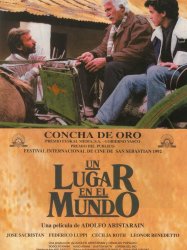
A Place in the World (1992)
, 2hDirected by Adolfo Aristarain
Origin Argentine
Genres Drama, Action, Western
Actors Federico Luppi, Cecilia Roth, José Sacristán, Rodolfo Ranni, Hugo Arana
Roles Zamora
Rating76%





The story is set in 1974, following the death of Argentine President Juan Perón. While they live their lives, the characters argue about the country's most controversial subjects at the time: religion, politics, and human rights.
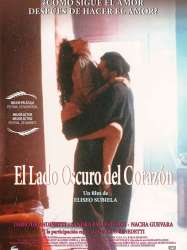
The Dark Side of the Heart (1992)
, 2h7Directed by Eliseo Subiela
Origin Argentine
Genres Drama, Comedy, Romance
Actors Darío Grandinetti, Nacha Guevara, André Melançon, Miguel Ángel Solá, Hugo Arana
Rating73%





Oliverio, poète à Buenos Aires, cherche une femme qui sache voler. C'est peut-être le cas de Ana, une prostituée qu'il rencontre dans le cabaret Sefiní de Montevideo.
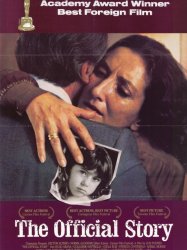
The Official Story (1985)
, 1h52Directed by Luis Puenzo
Origin Argentine
Genres Drama, Historical
Themes Seafaring films, Politique, Transport films, Political films, Films about Latin American military dictatorships
Actors Héctor Alterio, Norma Aleandro, Chunchuna Villafañe, Hugo Arana, Guillermo Battaglia, Pablo Rago
Roles Enrique Ibáñez
Rating76%





The film is set in Argentina in the 1980s, in the last years of the country's last military dictatorship, during which a campaign of State sponsored terrorism produced thousands of killings and torture of accused political leftists and innocents alike, who were buried in unmarked graves or became desaparecidos.

Crazy love (1979)
, 1h40Genres Drama, Comedy
Actors Ignacio Quirós, Osvaldo Terranova, Hugo Arana, Ulises Dumont, Arturo Maly, Roberto Carnaghi

The Island (1979)
, 1h46Directed by Alejandro Doria
Genres Drama
Actors Hugo Arana, Aldo Barbero, Erika Wallner
Rating68%






Los golpes bajos (1974)
, 1h35Directed by Mario Sábato
Genres Drama
Themes Sports films, Martial arts films, Boxing films
Actors Aldo Barbero, Héctor Alterio, Walter Vidarte, Ana María Picchio, Hugo Arana, Rodolfo Brindisi
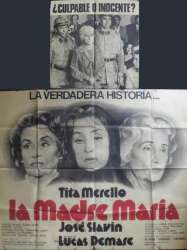
La Madre María (1974)
Directed by Lucas Demare
Genres Drama
Actors Tita Merello, Alejandra Da Passano, Hugo Arana, Patricia Castell, Rey Charol
Rating65%





La Madre María is based on the life of María Salomé Loredo, a renowned Argentina healer (1854-1928). The film begins with an old Madre Maria on trial for quackery and deceit. On a series of flashbacks, her life is told, starting with a visit María paid to another famous Argentina faith healer, Pancho Sierra.
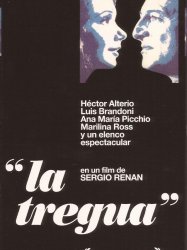
The Truce (1974)
, 1h48Directed by Sergio Renán
Origin Argentine
Genres Drama, Romance
Actors Héctor Alterio, Ana María Picchio, Aldo Barbero, Lautaro Murúa, Norma Aleandro, Sergio Renán
Rating72%





The film opens on Martín Santomé's (Héctor Alterio) 49th birthday, a widower and the father of three children: the eldest, the embittered Esteban (Luis Brandoni); the caring middle-child Blanca (Marilina Ross) and Jaime (Oscar Martínez), a closeted homosexual. He goes to work thinking they have forgotten his birthday, and once at the office, he assigns two new employees to their jobs: the effeminate, nervous Santini (Antonio Gasalla) and the young Laura (Ana María Picchio), with whom he soon develops a bond. Back home, Martín is surprised with a party thrown by his children.
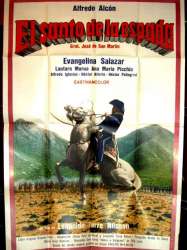
The Knight of the Sword (1970)
Directed by Leopoldo Torre Nilsson
Genres Drama, Biography, Historical
Actors Alfredo Alcón, Lautaro Murúa, Ana María Picchio, Héctor Alterio, Héctor Pellegrini, Aldo Barbero
Rating67%





The story relates the life and career of José de San Martín during the South American wars of independence. It starts with his return to Mendoza province, with the rest of the narration being told as a flashback.
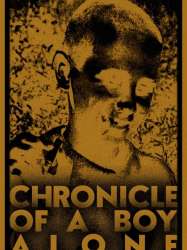
Chronicle of a Boy Alone (1965)
, 1h16Directed by Leonardo Favio
Origin Argentine
Genres Drama
Actors María Vaner, Leonardo Favio, Hugo Arana
Rating74%





Polin is an eleven-year-old troublemaker in reform school for unknown reasons. After suffering from harsh treatment at the hands of the staff there, Polin finally reaches a breaking point and snaps, punching one of the supervisors in the face. He is then sent to the police station where he is locked up in a cell and left alone. Polin soon breaks out and travels back to his hometown, a rural fishing village, where he meets up with his best friend and falls back into his old routine—smoking, pickpocketing, shoplifting, skinny dipping with his friends and picking fights with the neighborhood bullies—all the while trying to avoid a run-in with the law, which he knows is inevitable.
 Connection
Connection


